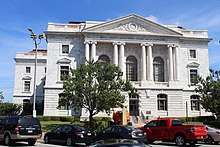William Augustus Bootle
William Augustus "Gus" Bootle (August 19, 1902 – January 25, 2005) was an American attorney and a United States District Judge of the United States District Court for the Middle District of Georgia noted for helping oversee desegregation in the Southern United States.
William Augustus "Gus" Bootle | |
|---|---|
| Senior Judge of the United States District Court for the Middle District of Georgia | |
| In office March 11, 1972 – January 25, 2005 | |
| Chief Judge of the United States District Court for the Middle District of Georgia | |
| In office 1961–1972 | |
| Preceded by | Thomas Hoyt Davis |
| Succeeded by | J. Robert Elliott |
| Judge of the United States District Court for the Middle District of Georgia | |
| In office May 20, 1954 – March 11, 1972 | |
| Appointed by | Dwight D. Eisenhower |
| Preceded by | Abraham Benjamin Conger |
| Succeeded by | Wilbur Dawson Owens Jr. |
| Personal details | |
| Born | William Augustus Bootle August 19, 1902 Walterboro, South Carolina |
| Died | January 25, 2005 (aged 102) Macon, Georgia |
| Education | Mercer University (A.B.) Walter F. George School of Law (LL.B.) |

Education and career
Born on August 19, 1902, in Walterboro, South Carolina, Bootle received an Artium Baccalaureus degree in 1924 from Mercer University and a Bachelor of Laws in 1925 from the Walter F. George School of Law at Mercer University. There he was a member of Phi Delta Theta.[1] He entered private practice in Macon, Georgia from 1925 to 1928 and again from 1933 to 1954. He was a part-time professor at Mercer University from 1926 to 1937 and served as acting dean from 1933 to 1937. He was an Assistant United States Attorney for the Middle District of Georgia from 1928 to 1929 and was the United States Attorney for the Middle District of Georgia from 1929 to 1933.[2]
Federal judicial service
Bootle was nominated by President Dwight D. Eisenhower on May 3, 1954, to a seat on the United States District Court for the Middle District of Georgia vacated by Judge Abraham Benjamin Conger. He was confirmed by the United States Senate on May 18, 1954, and received his commission on May 20, 1954. He served as Chief Judge from 1961 to 1972. He assumed senior status on March 11, 1972. His service terminated on January 25, 2005, due to his death in Macon.[2]
Notable case
Bootle ordered the first admission of an African-American to the University of Georgia in 1961 (Hamilton E. Holmes and Charlayne Hunter).
Death
Bootle's wife of more than 70 years, Virginia Childs Bootle, died on June 24, 2004. Bootle died at his home in 2005 at the age of 102.[3][4]
Honors
The federal building and courthouse at Macon, Georgia was renamed the William Augustus Bootle Federal Building and United States Courthouse in June 1998. In 1982, Bootle was awarded an honorary Doctor of Laws degree from Mercer University.
References
- "Phi Delta Theta biography". Archived from the original on 2005-02-08. Retrieved 2005-12-05.
- William Augustus Bootle at the Biographical Directory of Federal Judges, a public domain publication of the Federal Judicial Center.
- Fox, Margalit (January 27, 2005). "William A. Bootle, Judge in Desegregation Case, Dies at 102". The New York Times. Retrieved 6 December 2015.
- Hulett, Keith (December 9, 2005). "William Bootle (1902-2005)". New Georgia Encyclopedia. Georgia Humanities Council and the University of Georgia Press. Retrieved 6 December 2015.
Further reading
- Kelly, Mary (December 5, 2015). "Race, Murder, and the Law in 1957 Georgia". The Week. Archived from the original on 5 December 2015. Retrieved 6 December 2015.
External links
- William Augustus Bootle at the Biographical Directory of Federal Judges, a public domain publication of the Federal Judicial Center.
- Phi Delta Theta biography
- SR 604 - A resolution by the Georgia Senate "honoring the extraordinary life and career of the Honorable William Augustus Bootle; and for other purposes."
- Unsung Foot Soldier Project at the University of Georgia biography
- "Judge Bootle Dies at 102; Funeral Set Saturday" - Mercer University press release
- "Judge who desegregated University of Georgia dies" - MSNBC
| Legal offices | ||
|---|---|---|
| Preceded by Abraham Benjamin Conger |
Judge of the United States District Court for the Middle District of Georgia 1954–1972 |
Succeeded by Wilbur Dawson Owens Jr. |
| Preceded by Thomas Hoyt Davis |
Chief Judge of the United States District Court for the Middle District of Georgia 1961–1972 |
Succeeded by J. Robert Elliott |